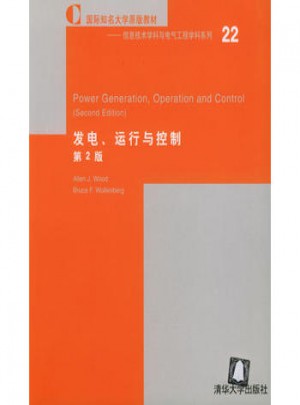
發(fā)電、運(yùn)行與控制(第2版·英文)
- 所屬分類:圖書 >工業(yè)技術(shù)>原版書
- 作者:[美][伍德],[美][伍倫伯格] 著
- 產(chǎn)品參數(shù):
- 叢書名:國際知名大學(xué)原版教材.信息技術(shù)學(xué)科與電氣工程學(xué)科系列
- 國際刊號:9787302076926
- 出版社:清華大學(xué)出版社
- 出版時間:2003-12
- 印刷時間:2003-12-01
- 版次:1
- 開本:--
- 頁數(shù):--
- 紙張:膠版紙
- 包裝:平裝
- 套裝:否

本系列教材的讀者對象為信息技術(shù)學(xué)科和電氣工程學(xué)科所屬各專業(yè)的本科生,同時兼顧其他工程學(xué)科專業(yè)的本科生或研究生。本系列教材,既可采用作為相應(yīng)課程的教材或教學(xué)參考書,也可提供作為工作于各個技術(shù)領(lǐng)域的工程師和技術(shù)人員的自學(xué)讀物。
Allen J.Wood:美國Rensselaer Polytechnic Institute電力工程研究生部客座教授,Power Technologien,Inc.(紐約)博學(xué)獨立顧問。曾任美國電氣及電子工程師學(xué)會(IEEE)電力工程教育委員會主席。
Perface to the Second Edition
Preface to the First Edition
1 Introduction
1.1 Purpose of the Course
1.2 Coures Scope
1.3 Economic Importance
1.4 Problems:New ang Old
Further Reading
2 Characteristics of Power Generation Units
2.1 Characteristics of Steam Units
2.2 Variations in Steam Unit Characteristics
2.3 Cogeneration Plants
2.4 Hight-Water Moderated Nuclear Reactor Units
2.5 Hydroelectric Units
Appendix:Typical Generation Data
References
3 Economic Dispatch of Thermal Units and Methods of Solution
3.1 The Economic Dispatch Problem
3.2 Thermal System Dispatching with Network Losses Considered
3.3 The Lambda-Iteration Method
3.4 Gradient Methods of Economic Dispatch
3.5 Newton's Method
3.6 Economic Dispatch with Piecewise Linear Cost Functions
3.7 Economic Dispatch Using Dynamic Programming
3.8 Base Point and Participation Factors
3.9 Economic Dispatch Versus Unit Commitment
Appendix 3A:Optimization within Constraints
Appendix 3B:Dynamic-Programming Applications
Problems
Further Reading
4 Transmission System Effects
4.1 The Power Flow Problem and Its Solution
4.2 Transmission Losses
Appendix:Power Flow Input Data for Six-Bus System
Problems
Further Reading
5 Unit Commitment
5.1 Introduction
5.2 Unit Commitment Solution Methods
Apendix:Dual Optimization on a Nonconvex Problem
Problems
Further Reading
6 Generation with Limited Energy Supply
6.1 Introduction
6.2 Take-or-Pay Fuel Supply Contract
6.3 Composite Generation Production Cost Function
6.4 Solution by Gradient Search Techniques
6.5 Hard Limits and Slack Variables
6.6 Fuel Scheduling by Linear Programming
Appendix:Linear Programming
Problems
Further Reading
7 Hydrothermal Coordination
7.1 Introduction
7.2 Hydroelefctric Plant Models
7.3 Scheduling Problems
7.4 The Short-Term Hydrothermal Scheduling Problem
7.5 Short-Term Hyrdo-Scheduling:A Gradient Approach
7.6 Hydro-Units in Series (Hydraulically Coupled
7.7 Pumped-Storage Hydroplants
7.8 Dynamic-Programming Solution to the Hydrothermal Scheduling Problem
7.9 Hydro-Schedulint Using Linear Programming
Appendix:Hydro-Scheduling with Storage Limitations
Problems
Further Reading
8 Production Cost Models
8.1 Introduction
8.2 Uses and Types of Production Cost Programs
8.3 Probabilistic Production Cost Programs
8.4 Sample Computation and Exercise
Appendix:Probability Methods and Uses in Generatio Planning
Problems
Further Reading
9 Control of Generation
9.1 Introduction
9.2 Generator Model
9.3 Load Model
9.4 Prime-Mover Model
9.5 Governor Model
9.6 Tie-Line Model
9.7 Generation Control
Problems
Further Reading
10 Interchange of Power and Energy
10.1 Introduction
10.2 Economy Interchange between Interconnected Utilities
10.3 Interutility Economy Energy Evaluation
10.4 Interchange Evaluation with Unit Commitment
10.5 Multiple-Utility Interchange Transactions
10.6 Other Types of Interchange
10.7 Power Pools
10.8 Transmission Effects and Issues
10.9 Transactions Involving Nonutility Parties
Problems
Further Reading
11 Power System Security
11.1 Introduction
11.2 Factors Affecting Power Sysytem Security
11.3 Contingency Analysis:Detection of Network Problems
Appendix 11A:Calculation of Network Sensitivity Factors
Appendix 11B:Derivation of Equation 11.14
Problems
Fruther Reading
12 An Introduction to State Estimation in Power Systems
12.1 Introduction
12.2 Power System State Estimation
12.3 Maximum Lidelihood Weighted Least-Squares Estimation
12.4 State Estimation of an AC Network
12.5 State Estimation by Orthogonal Decomposition
12.6 An Introduction to Advanced Topics in State Estimation
12.7 Application of Power Systems State Estimation
Appendix:Derivation of Least-Squares Equations
Problems
Further Reading
13 Optimal Power Flow
13.1 Introduction
13.2 Solution of the Optimal Power Flow
13.3 Linear Sensitivity Analysis
13.4 Linear Programming Methods
13.5 Security-Constrained Optimal Power Flow
13.6 Interior Point Algorithm
13.7 Bus Incremental Costs
Problems
Further Reading
Appendix:About the Software
Index
個人尤其喜歡經(jīng)濟(jì)有關(guān)的部分。不錯的書。值得推薦。
這次不錯,速度快多了,兩天就到了。書封皮有些舊,嚇了一跳,還以為買了舊書了,翻了翻才放心了,還不錯。
it's very good and suitable for us
電力系統(tǒng)基礎(chǔ)的經(jīng)典教材,潮流、經(jīng)濟(jì)調(diào)度、網(wǎng)損、功率交換、狀態(tài)估計、最優(yōu)潮流都有論述,每章常常有相應(yīng)的補(bǔ)充材料幫助讀者理解,強(qiáng)烈推薦此書!期待第3版引入國內(nèi)!